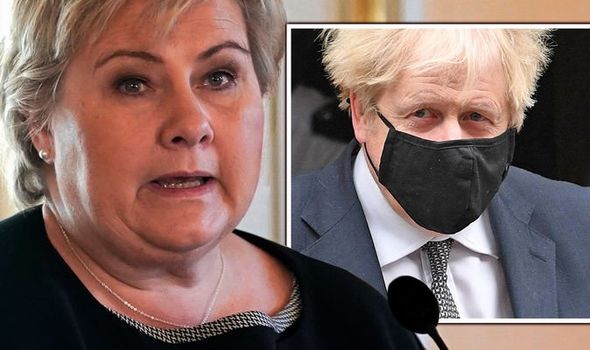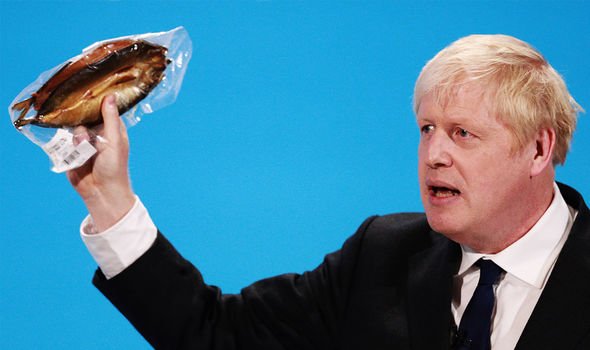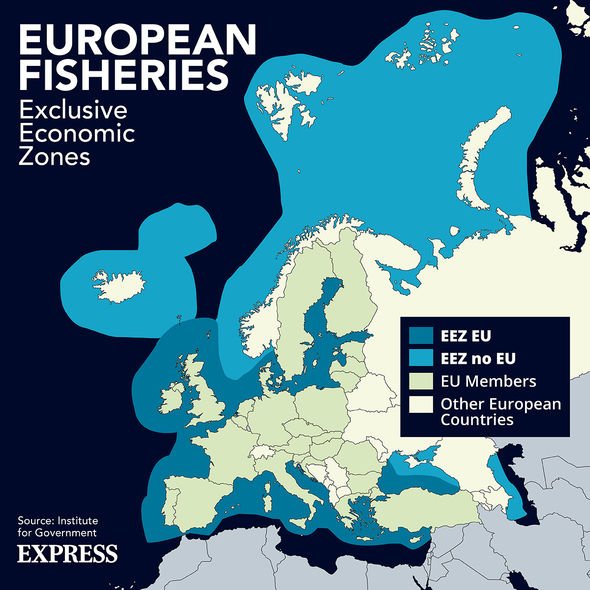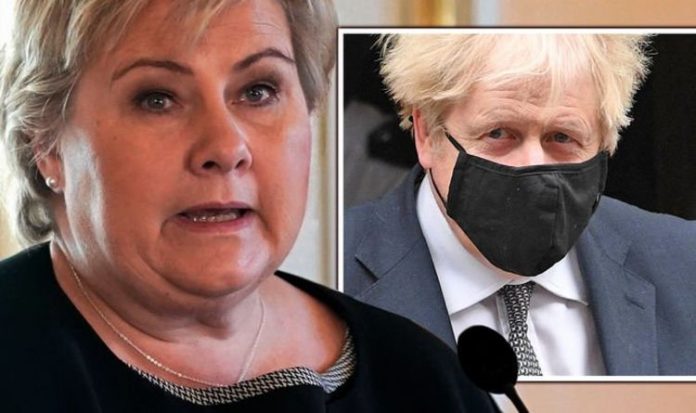Brexit: Raab addresses ‘outlandish’ EU fishing proposals
With just two weeks to go until the end of the transition period, the UK and EU must come to an agreement on fishing rights if a trade deal is to be reached. Prime Minister Boris Johnson has been pushing for the UK to take back control of its waters and to operate a Norway-style system whereby access for other countries is negotiated annually. He has even threatened to deploy Royal Navy warships to patrol British waters if an impasse on this issue tips the UK into a no deal situation.
However, EU sources reportedly claimed last night he has made one huge concession and dropped his fight for fishing vessels operating under the UK flag to be majority British owned.
The UK has a history of fishing disputes with its neighbours, in particular Norway, another significant coastal power.
Back in 1982, the two countries clashed over fishing numerous times and Norway even requested to enforce Norwegian laws on their ships in UK waters.
However, this was rejected by the authorities in Britain, who asserted that enforcement should be the responsibility of the coastal state.
READ MORE: Fishing fury: How bust-up sparked WAR fears amid Brexit talk chaos

Erna Solberg, Prime Minister of Norway and Boris Johnson (Image: GETTY)

Fishing has proved to be a major sticking point in Brexit negotiations (Image: GETTY)
Documents unearthed by Express.co.uk at the National Archives reveal a request from the Norwegian government to overfly part of the UK’s fishing waters to search for some of their own vessels.
At the time, Norway had imposed a prohibition on herring fishing by its own vessels under its country’s national laws.
However, due to the Common Fisheries Policy and a Norway-EU agreement, Norwegian vessels were allowed to fish in other countries’ waters, where Norway had no legal jurisdiction.
For this reason, the Norwegian flight tasking authorities asked Maritime Headquarters in Pitreavie, Scotland for permission to conduct an air search in UK waters for Norwegian vessels breaking this law.

Boris Johnson promised to stand up for British fishermen (Image: GETTY)
The purpose of the flight would be to look for and photograph a number of Norwegian purse seine fishing vessels, which they suspected were herring fishing in the North Sea.
They proposed that they would prosecute them once they returned to Norway.
However, the Department of Agriculture and Fisheries for Scotland (DAFS) rejected the request.
One official aid wrote in a letter to the Maritime, Aviation and Environmental Department (MAED): “I felt that inevitably a flight in the area would be the prime object of exercising some kind of control over the Norwegian fishing vessels involved and that this would not be acceptable to the UK who, as a coastal state, has sole responsibility for fisheries enforcement in the area.”
DON’T MISS
French fisherman’s threat to HANG British naval officer exposed [EXCLUSIVE]
UK fishing row: How Iceland ‘suffered from colonial exploitation’ [INSIGHT]
Brexit bombshell: Tell-tale sign EU knows UK will NEVER rejoin exposed [REVEALED]

European fisheries (Image: EXPRESS NEWSPAPERS)
“The idea has been rejected on the grounds that the enforcement of fishery regulations was for the coastal state.
“Although it was difficult to advise without knowing more of what the Norwegians actually proposed to do, you suggested that, while we could not stop them from flying around, we should be unwilling for them to carry out any policing activities in our waters.”
They added that Norwegian vessels are subject to Scottish or English law, including laws from the European Economic Community (EEC), the precursor to the EU.
However, Maritime Headquarters organised for an RAF Nimrod aircraft to conduct a patrol and offered the Norwegians relevant information from their own patrols.
Brexit: Andrew Bridgen suggests possible fishing compromise
Reclaiming control of fishing waters has become a sticking point in Brexit talks, with numerous EU countries concerned that it would decimate their own fishing industries.
This is because UK waters have six times the fish stocks of the rest of the EU combined.
Under the Common Fisheries Policy, which began in 1983, all EU countries have access to each other’s waters.
Upon leaving the bloc, the UK should regain control of its 200 nautical miles Exclusive Economic Zone (EEZ), as per UN convention.

Exclusive Economic Zones of UK and neighbouring coastal countries (Image: GETTY)
Currently, Norway allows EU and therefore UK boats to fish in its own EEZ waters in return for market access as well as the right to fish in the EU’s, and particularly the UK’s EEZs.
For some species like farmed salmon, Brexit may increase competition between the UK and Norway, and the UK’s EU access advantage could disappear, potentially leading to increased tensions between fishermen.
As the European Economic Area (EEA) does not cover fisheries, Norway and other EEA countries do not benefit from entirely free trade with the EU ‒ there are different rules for different fish, as well as for processed and unprocessed fish.
With the deadline for Brexit talks drawing ever nearer, European Commission President Ursula von der Leyen said an agreement on fishing is “so close but yet… so far away”.







